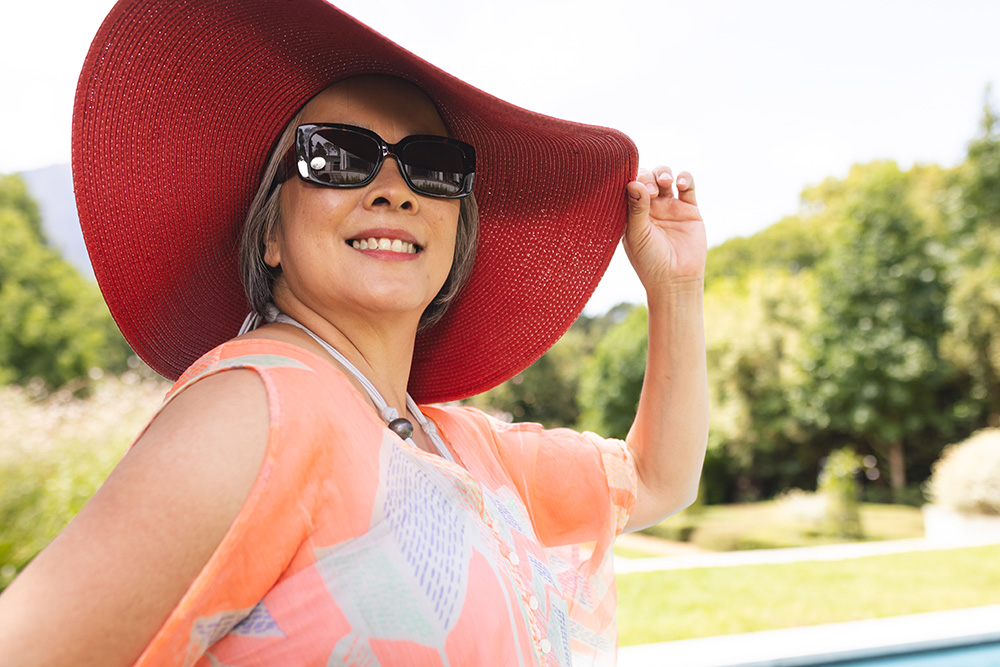Spending time outdoors is important for your health at any age. Fresh air and time in the sun help boost your mood and overall quality of life. For older individuals, this can be especially important. But safety in the sun is also very important. Proper sun protection when going outside can be especially vital for older adults. Below, we will share some tips to keep elder individuals safe while enjoying time in the sun.
Sun Protection Beyond Summer Months
Most people think that they only need sunscreen for the beach or a day by the pool. But the sun can affect you year-round. While spring is a great time to enjoy the outdoors without blazing heat, the sun is still a factor. Protecting yourself from the sun throughout the year can be important for maintaining your skin and
Why Sun Protection Matters More with Age
With age, your skin gets thinner and frailer. Over time, it becomes more susceptible to sun damage. Furthermore, your nervous system receptors dull with age. This causes you to be less responsive to hot temperatures or early signs of dehydration. These compounding factors can make prolonged sun exposure dangerous for aging adults. As a result, you need to be much more careful in the sun.
Hydration in the Sun
Staying hydrated is essential to keeping cool and comfortable while outdoors. Hydration is also important to your health in general. Most older individuals do not drink enough water, as is. As mentioned above, your thirst receptors dull with age, making it harder to notice early feelings of dehydration. Sun exposure and spending time in the heat can cause the body to expel more water through perspiration. You should drink water before, during, and after outdoor activities. When outside, avoid drinks with caffeine or alcohol, which can contribute to dehydration.
Using Effective Sunscreen
Sunscreen is a vital part of sun safety. But choosing the right sunscreen matters. Look for products that protect against UVA and UVB rays, and are SPF 30 or more. They should apply sunscreen 15 minutes before sun exposure, and then every 2 hours while outside. When spending time in water, you should still reapply sunscreen, even if it is waterproof.
Wearing Weather-Appropriate Clothing
Sun damage doesn’t just happen in the summer. Wearing weather-appropriate clothes can help minimize the effects of the sun. However, not all clothes defend against the sun in the same way. Lighter-colored clothing absorbs less sunlight and UV rays. This will help keep you cooler and less affected by the heat and sun. Breathable fabrics can also help them stay cooler outside on hot days. For added protection, consider wearing clothes rated for Ultraviolet Protection Factor (UPF). These clothes are designed with sun protection in mind.
Hats and Sunglasses
Wide-brimmed hats offer sun protection to the face, neck, and ears. This can keep them cool while reducing sun damage to these easily exposed areas. Hats can be especially important when you go to areas with little to no shade available, or if you are spending a long time in the sun. Sunglasses offer protection for the eyes. Protecting your eyesight with sunglasses can help reduce vision loss over time. Look for sunglasses rated to block 100% of UV rays. Additionally, polarized lenses can help reduce glare in high-light areas.
Safe Harbor Healthcare Services does not provide medical, healthcare, or financial advice via articles. This material has been prepared for informational purposes only. It is not intended to provide and should not be relied on for advice.
Safe Harbor Healthcare Services has provided excellent home care on Staten Island since 1967. Our services help older and disabled individuals live safely and independently while giving their families the peace of mind they need. For more information, contact us or call (718)-979-6900.

